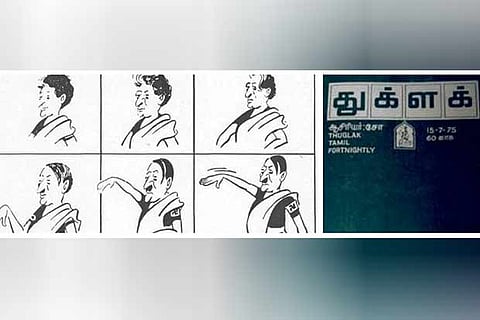

Chennai
A state of emergency was imposed by Prime Minister Indira Gandhi in June 1975. Suddenly, India found herself under a dictatorship with all fundamental rights suspended. For about seven months, Karunanidhi refused to allow the shadows of the Emergency to fall on Tamil Nadu knowing the price he would pay. Tamil Nadu remained an island of democracy where leaders like George Fernandes fleeing the Emergency police took refuge.
Interestingly, a Wikileaks of 2013 mentioned that George Fernandes reportedly claiming to American intelligence that the 1975 fire of LIC building had been an act of sabotage by him. The CIA expressed doubt on his claim. In a public meeting on the Marina, Karunanidhi asked the crowd to take a pledge. “We will not hesitate to protect people’s rule in India,” roared 5 million voices. Indira, remembering DMK’s past friendship, had indeed given it a long rope but this was the last straw.
While attending a function at Don Bosco School, Karunanidhi said: “Most probably, this will be my last public function as a Chief Minister.” He was dismissed before he reached home. The irony was it happened just 50 days before his rightful term was over.
Archrival MGR and his fledgling ADMK party supported the Emergency but believing that regional parties would be banned, MGR hurriedly added the words ‘All India’ to his Anna DMK.
Post-dismissal, the DMK suffered extensive damage. As many as 25,000 party members including Karunanidhi’s close family and friends were ruthlessly hunted and thrashed in jails. A member of parliament, Chittibabu, died a day after release.
The DMK mouthpiece Murasoli circumventing censorship merely published a list of arrested leaders, announcing that they would not be attending a party function. The party men got the hint.
When DMK functionaries were jailed, the party dutifully sent Rs. 200 a month to their families. (Later, when a party orator complained to Karunanidhi that his wife had received only Rs 100 every month, Karunanidhi explained that he had sent the other 100 to orator’s second wife). But surprisingly, when the entire country whispered of police horrors and curbed rights, people in Madras knew very little.
Ironically, Madras found the Emergency quite a satisfying experience. People were happy that government offices worked better: frequent power cuts were curbed, roads were re-laid and trains and buses ran on time. It was only post Emergency the people of Madras learned the horrors of the disturbing period.
A censor sat in Sastri Bhavan and editors took their papers there for censoring. Many were humiliated by being made to stand all the time. Cho used to jocularly call the censor the editor of Thuglak. While other papers needed to come to the censor in case of a doubt, three papers — The Indian Express, Murasoli and Thuglak — had to have every word pre-checked. The last even had to have its advertisements checked.
Cho Ramasamy, not to be outdone, played a cat and mouse game with the censor. Cho’s Thuglak sometimes blackened its covers or printed empty pages. All of a sudden Thuglak would review an old Tamil movie Sarvathakari (Dictator). Another time he had published a Bharathiyar song about freedom which had some contextual relevance.
Some magazines published cartoons about the moustache (meesai in Tamil) punning on the word of the draconian Maintenance of Internal Security Act (MISA). Express came out with a special supplement, listing the national leaders who had been jailed along with a cartoon of President Fakruddin Ali Ahmed signing the proclamation of emergency while still in the bathtub. Murasoli ran an Indira caricature morphed into Hitler’s. The cartoon was picked up by Newsweek and it made the PM very angry.
The national opposition knew that Indira cared too much for world opinion to make the Emergency permanent. So plans for a national front went on in the jails. Jayaprakash Narayan hoped Kamaraj would head it. It was poetic justice. For, Kamaraj had initially helped Indira to become PM. But tragically, a heartbroken Kamaraj was dying.
In 1977, Indira called for elections and the Congress was thoroughly thrashed. Most of the opposition parties which had fought against the Emergency gained a political foothold. Unfortunately, DMK which had been in the forefront was not able to make election gains. The MGR wave had started in Tamil Nadu.
Memories are very short in politics and in the biggest volte-face, DMK joined hands with Indira’s Congress (whose police had battered family friends and followers) to fight the 1980 election.
— The writer is a historian and an author
Visit news.dtnext.in to explore our interactive epaper!
Download the DT Next app for more exciting features!
Click here for iOS
Click here for Android